Puppy First Night: What to Do and How to Prepare?

Congrats, you got a dog! Before you can truly enjoy their company, there are some things to consider for your puppy’s first night at home. Adjusting to a new environment can be difficult for any dog, so this article will outline some tips for ensuring your puppy's smooth transition.
It’s vital to provide your new pet with the best possible support to make their first experience at your new home easy.
Importance of the first night with a puppy
Introducing a new furry family member to your household is an exciting experience. However, it can also be stressful and overwhelming for your puppy as they adjust to their new surroundings.
To ensure that your furry friend's transition period goes well, you must make them feel secure with an appropriate sleeping area, maintain a daily routine, and give your pet love and kindness. This way, you will help your furry companion settle in and form a strong bond with you.
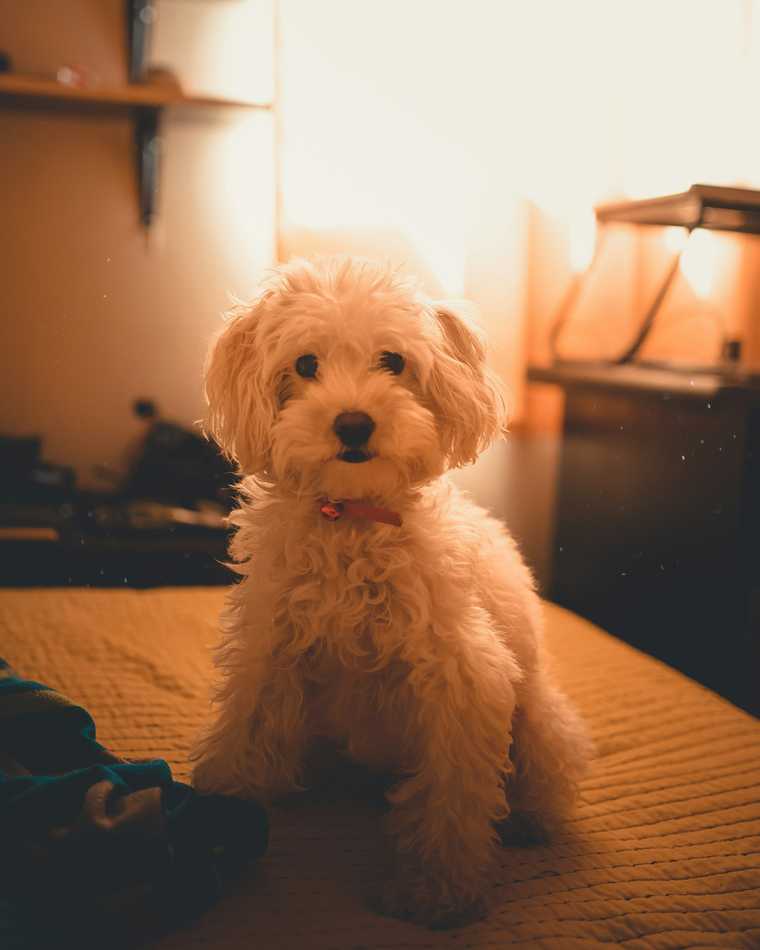
Preparing for the first night with a new puppy
When your puppy is ready to come home with you, it’s vital to start thinking about preparing your place for your puppy’s arrival. From creating a safe and comfortable sleeping area to providing the right toys and supplies, there are plenty of things you can do to help your furry friend feel calm and secure as they settle in for sleep.
So, roll up your sleeves, grab a coffee, and let’s prepare for your puppy’s first night.
1. Checklist of items for the first night
To guarantee your dog’s experience of sleeping as stress-free as possible, it’s essential to be well-prepared. Here’s a checklist of items you’ll need first few nights:

- A suitable bed or crate
- Comfortable bedding
- Safe and appropriate toys
- Water and food bowls
- Food and treats
- Pads or newspaper for accidents
2. Take a before-bed potty break
Taking your young dog for a potty break is crucial to ensuring a successful night's sleep. If you’re asking yourself how often to take a puppy out at night, here’s a simple checklist to help you remember all the essentials:
- Arrange it right before bed
- Choose a designated spot in your area for a potty break
- Offer reward/praise or treats for going potty outside
3. Create a safe and comfortable sleeping area
Choosing a suitable bed or crate is paramount for your dog’s comfort and safety. It should be large enough to stand up in, turn around, and lie down. You can use a soft blanket or cushion to make it cozy and inviting.
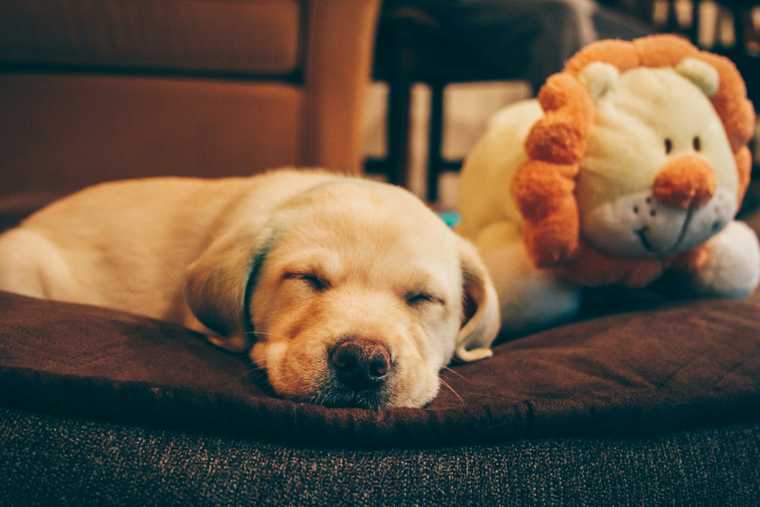
4. Share the room
Where should a puppy sleep the first night? Upon their arrival in a new house, keeping your puppy close is wise. Providing them with bedding or a crate in your bedroom should be considered. This will help them feel safe and secure knowing you’re near. Being close to your pet after bedtime can help reduce anxiety, thus minimizing the chances of crying during the night.

5. Stick to a routine
Routine works magic when adapting a canine to a new environment. The predictability of daily activities provides a much-needed feeling of comfort that reduces stress and anxiety levels in dogs. As a result, they behave better and feel safer sleeping with new parents.
6. Provide enough physical exercise
Before bedtime, it’s crucial to tire your dog out with some exercise and playtime. This can help burn off excess energy and create a feeling of relaxation at bedtime. However, avoid overly stimulating activities that may make your pup too excited or hyperactive.
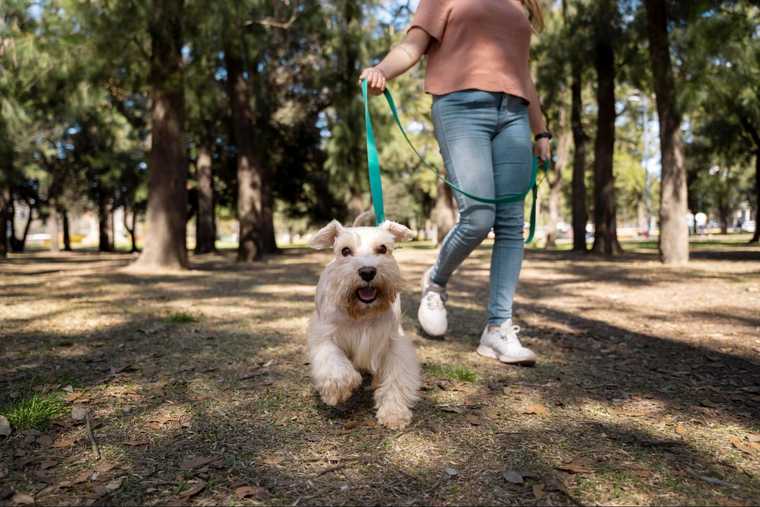
7. Stay calm and patient
It’s normal for young puppies to cry or whine during their first night in their new home. Remember to stay calm and patient, reassuring them with a gentle voice and comforting touch. Avoid scolding or punishing them, which can lead to anxiety and fear.
Tips for the first night with a puppy
Before your new puppy's first night, you should start planning carefully, not only the night itself but also the next day. From feeding and dealing with nighttime whining and potty breaks to playtime and training, the first full day with your new dog can set the tone for the rest of their life with you.
Let's establish a proper night and next-day routine for your new furry companion.
Tip #1: Set fixed bedtime
Whether you start getting your young puppy ready for sleep at 9 pm or 11 pm, the key is consistency. The predictability of your bedtime routine helps a puppy adjust better to your household's new rules and boundaries.
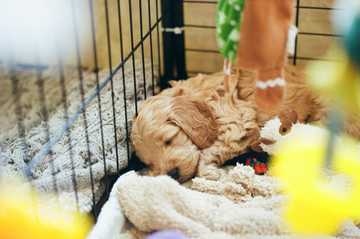
Feel free to help your dog settle in the crate. You can use a stuffed toy or a cozy blanket to make the crate more comfortable. An item that smells like the pup’s dog mother can be helpful. Additionally, a small treat inside the crate can be a good form of encouragement for puppies reluctant to step in.
Tip #2: Have an extra potty break if needed
Not all young canines can make it through the night without a need to go potty. If you hear your pup whining in the crate after bedtime, take them to the potty. Keep the break short; don’t start playing or interacting too enthusiastically. Once the potty break is over, take your pup back to the crate.
Tip #3: Avoid taking a pup to your bed
This tip is for those who don’t want to share the bed with their dog in the future. If the pooch starts crying at night, encourage them to stay in their crate. You can move the crate closer to your bed, but your goal is to teach your dog that it’s their den: a safe, cozy, comfortable place to sleep.
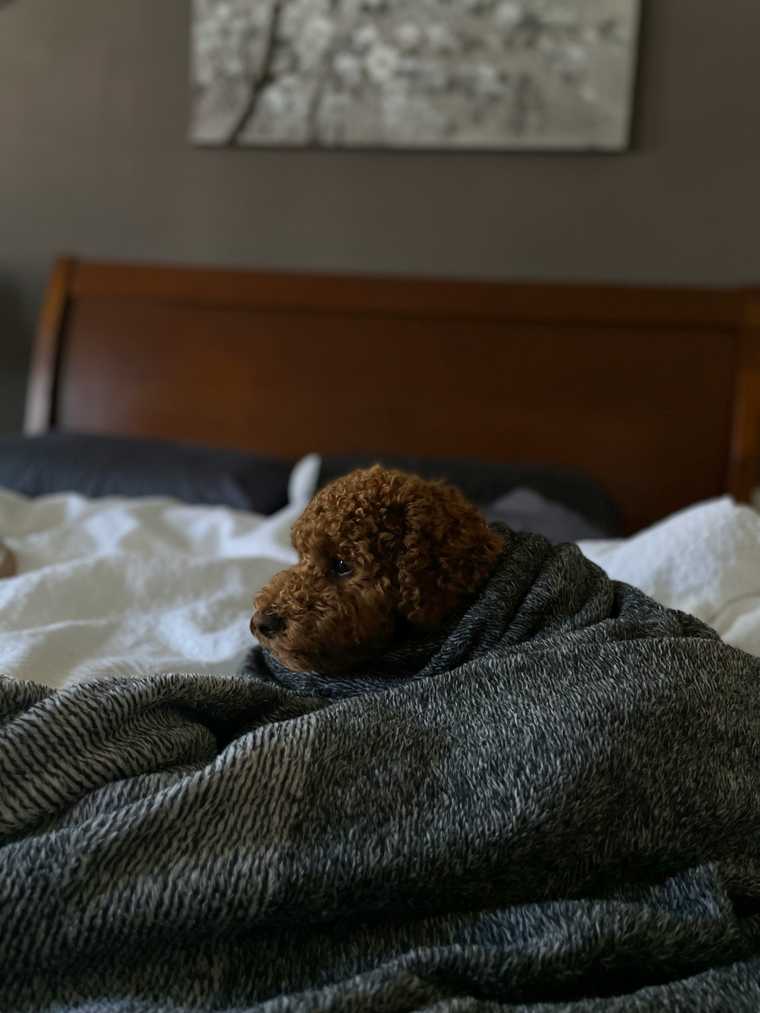
Tip #4: Ensure adequate care throughout the day
We've compiled a list of things you can do to take care of your pup properly so they can be healthy and happy:
- Take your pup out regularly
- Provide healthy food
- Play and exercise with them
- Monitor your dog’s behavior and health, and seek veterinary care if needed
- Get them appropriate toys and chews to play with
- Spend quality time bonding with your new dog and building trust
Follow these tips to ensure your puppy gets the best possible start in their new environment.
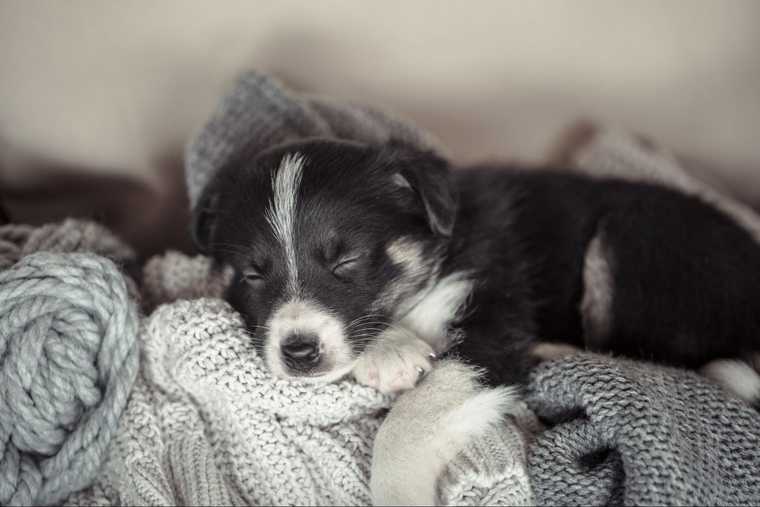
Wrap up
The transition to a new home can be challenging for any canine, but with proper preparation, patience, and love, you can make it a positive experience for you and your furry friend. Remember to create a safe and comfortable sleeping area, stick to a routine, and stay calm and patient if your puppy cries or whines during the night. With time and consistency, your dog will adjust to their home, and you’ll both enjoy many happy years together. Good luck, and have fun!
Frequently Asked Questions

Passionate team dedicated to help pet owners raise safe and obedient dogs, fostering meaningful connections with their furry companions.

Certified dog trainer, exclusive positive reinforcement methods & tackling aggression problems.